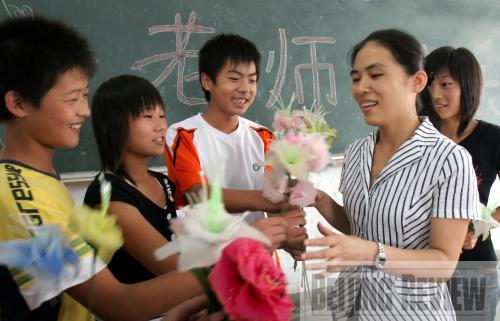|
 |
|
ART OF GIVING: Students in Huaibei Industrial Polytechnic School in Anhui Province present a bundle of flowers to their teacher on Teachers' Day in 2007 (XINHUA) |
Brands Mean More
In China, the major criteria for assessing enterprises' strength are not their technological competitiveness or managerial level, but their background and capability to control resources. The result is that China's top 500 enterprises are all big in size. Some of them even surpass many of the largest corporations in the United States in terms of assets. The problem is, however, China has large enterprises, but only a few influential brands in the international market.
Why does this happen? The reason is simple: Of the top 500 Chinese enterprises, most are resource-based companies in mining and power sectors or monopoly enterprises such as state-owned petroleum companies and banks.
Branding is the core competitive edge of enterprises, and thus it's important for Chinese enterprises to develop their own brands. Only when the top 500 Chinese enterprises include more big-brand names, not just those big in assets, can we say they are really strong.
Yanzhao Metropolis Daily
Follow Local Trends
The China Tourist Hotel Association recently published the revised Chinese Hotel Industry Service Guideline, in which an article stipulating that hotel clients "should check out before 12 p.m. or they have to pay surcharges" is deleted. Despite this, most hotels across the country have resisted changing their checkout deadline, claiming that all their counterparts in other countries and regions follow this time schedule. The debate around this topic has been a long and drawn-out one.
In reality, there are too many examples of blindly following international practices, though some of them are totally against China's national conditions or are already abandoned in countries or regions where they originated because of outdating. Ironically, they are still followed in China. Worse still, some businesses and even government departments are turning to these so-called international practices for their own interests.
What we need are rational international practices that can help us to improve our work. As for those unreasonable rules such as the mandatory hotel checkout deadline, we need to eliminate them as quickly as possible.
Guangzhou Daily
Keep It Simple
In China, the success of many public events now seems to depend on the extravagance of the opening ceremony.
How to create a spectacular opening ceremony? It should be on a large scale, with as many participants as possible, including well-known entertainment celebrities. Big events feature well-known stars, while small events try to make them better known through the big stars they invite.
For example, the opening ceremonies of the Olympic Games, the Asian Games and the National Games of course are big-budget projects. But nowadays, opening ceremonies of some provincial sports meets also cost a fortune. The enormous input in manpower, money and time have organizers racking their brains to come up with creative ways of impressing at opening ceremonies across the country.
Actually, the opening ceremony is nothing more than an announcement to tell people that a public event has begun. A cost-effective opening ceremony will not lower public attention on a really appealing event, but instead help save huge amounts of taxpayers' money. Why not have a try?
People's Daily
Gifts Not Wanted
Every year, Teachers' Day (on September 10) sparks off debates on teachers' welfare benefits, as well as the relationship between teachers and students and between schools and parents.
A media survey showed that 65 percent of surveyed teachers said that a text message of good wishes for Teachers' Day was sufficient to express students' gratitude. But most of surveyed students' parents were afraid that teachers would mishandle their children if they did not offer gifts.
In recent years, the relationship between teachers and students has become increasingly twisted. As a result, parents are more and more anxious whether their children would be equally treated at school.
Before this year's Teachers' Day, some schools sent text messages to their students' parents, asking them not to offer gifts to teachers. However, some parents read this as a suggestion that it's time to offer teachers gifts. Some parents are worried that, if teachers' salary and welfare benefits are poor, they won't really concentrate on teaching. In their view, gift offering will make teachers more focused on their teaching work. Therefore, to enhance mutual trust between teachers and parents, it's important to improve teachers' social status, simply put, to regularly raise their salary and welfare benefits.
It's hoped that Teachers' Day will become just a festival for hardworking teachers, and not always mixed up with gift scandals.
Shanghai Morning Post | 